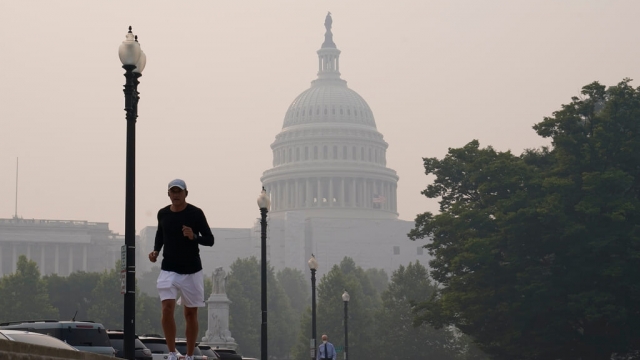According to experts, the best way to prevent breathing in the harmful particles from wildfire smoke is to stay indoors. But what can you do indoors to further minimize exposure?
As the thick and hazardous smoke from the wildfires in Quebec and Nova Scotia threatens millions of Americans, it’s inevitable for the smoke to infiltrate your home through cracks and imperfect seals. Here are some tips from the Environmental Protection Agency on how to protect indoor air quality.
- Besides keeping all your doors and windows closed, turn off any ventilation systems that bring outdoor air inside, such as Energy Recovery Ventilators.
- If you have an HVAC/AC unit, check that your filters are high-quality, up-to-date and set to "recirculate mode" to avoid bringing in smoke from outside.
- If you have a window unit air conditioner, check that it's sealed to the window correctly and as tightly as possible.
- Consider investing in portable air purifiers, placing one in each room. If purchasing one is not an option, the EPA has instructions on how to make your own with a filter, a box fan, and tape, clamps or a bungee cord.
- Keep a supply of N95 respirator masks on hand.
- Lastly, try to avoid activities that would add more particles to the air in your home, like smoking, burning candles, spraying aerosol products, vacuuming, or frying food.
SEE MORE: How to protect pets from wildfire smoke
The issue is the very fine particulate matter that gets inhaled. Breathing that in, even in small amounts, should be avoided, according to experts.
"The key message really is to really limit your time outdoors to the extent possible, to stay indoors as much as possible. Protect the air in your car, in your home. Really try to keep the smoke from coming in," said William Barrett with the American Lung Association.
Wildfire smoke can cause symptoms like sneezing and watery or burning eyes, phlegm or a wheezing cough. It can make breathing difficult or aggravate a person's asthma. For certain cardiovascular patients, it can lead to stroke or heart attack.
If you have to go outdoors, these are some tips to keep in mind:
- If you’re in a car, put the air on the recirculate setting.
- Wear an N95 respirator mask.
- Limit physical activity and avoid doing anything strenuous.
Trending stories at Scrippsnews.com




